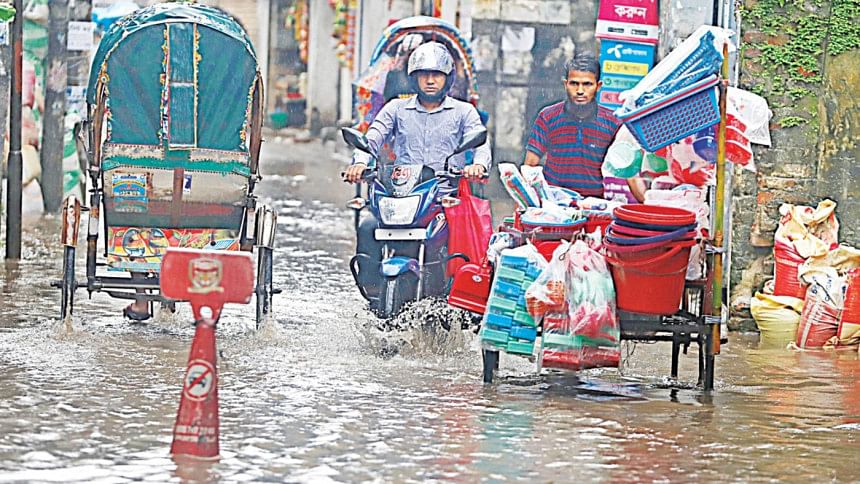Solving Dhaka’s perennial waterlogging

Our two Dhaka city mayors have expressed their wish to take over the responsibility of drainage management from Dhaka Wasa in a bid to end the capital's perennial waterlogging problem. While we appreciate their enthusiasm to solve this long-standing issue, we would like to remind them that they must engage with all other organisations tasked with managing drainage to rid the city of its waterlogging woes. As Transparency International Bangladesh has pointed out, there is a culture of lack of coordination, unhealthy competition, and shifting blame, among different authorities, which compounds the problem rather than solve it. This culture must be broken if we are to expect any change of the situation in the future.
The two mayors recently criticised the Water Supply and Sewerage Authority (Wasa) and Bangladesh Water Development Board (BWDB) for their failure to solve this recurring problem, including their ineptitude in properly cleaning the canals, drains and box culverts and pumping out storm water in time after rain. While the lack of capability of Wasa and BWDB has been criticised by all, the two city corporations must also be questioned for their failure in drainage management and waste disposal, as they could not ensure that the 2,500km of drains under their jurisdiction are waste-free or operational.
Although giving the DNCC and DSCC the full authority in this regard could be a possible solution, that would only work if they can actually coordinate with six other organisations who are also involved in the process. Moreover, in order to prove their capability and efficiency, the two city corporations should first deliver on their expected duties as per their legal mandate.
If given the responsibility, the city corporations will need all the manpower and equipment from Wasa and will have to be given jurisdiction over not only the canals but also the banks of the canals from the deputy commissioner's office so they can protect them from encroachment. And since conservation of water bodies—rivers, canals, wetlands, water retention areas, and flood flow zones—are all vital for drainage of storm water, working in coordination with Rajuk will be necessary to save them from being grabbed. Dhaka has already lost around 50 of its canals that once played a crucial role in its drainage system. They must be recovered through proper coordination and action. Rajuk and the city corporations must work together to implement the detailed area plan.
Therefore, there should be no doubt that the city corporations alone cannot perform this huge task. But they can surely take the lead through proper legal reforms and coordinate with all the agencies concerned to save Dhaka from its recurrent waterlogging problem.

 For all latest news, follow The Daily Star's Google News channel.
For all latest news, follow The Daily Star's Google News channel. 



Comments